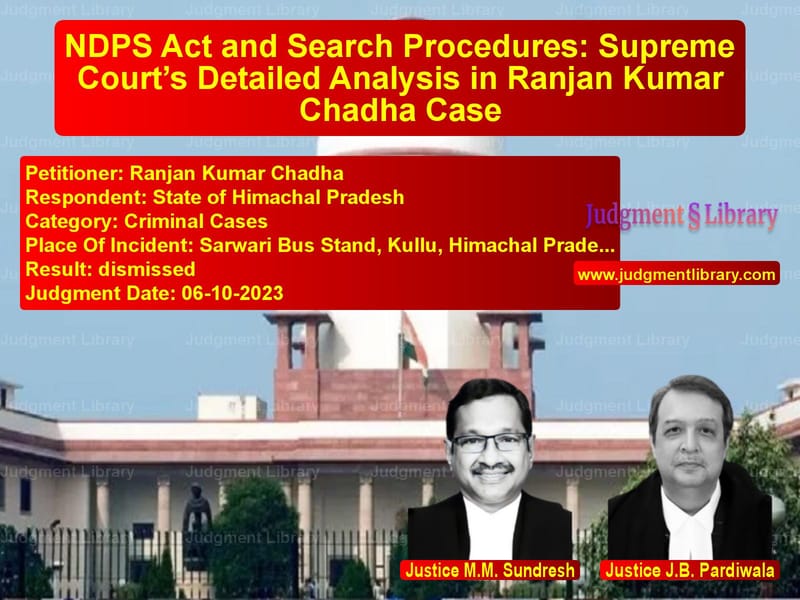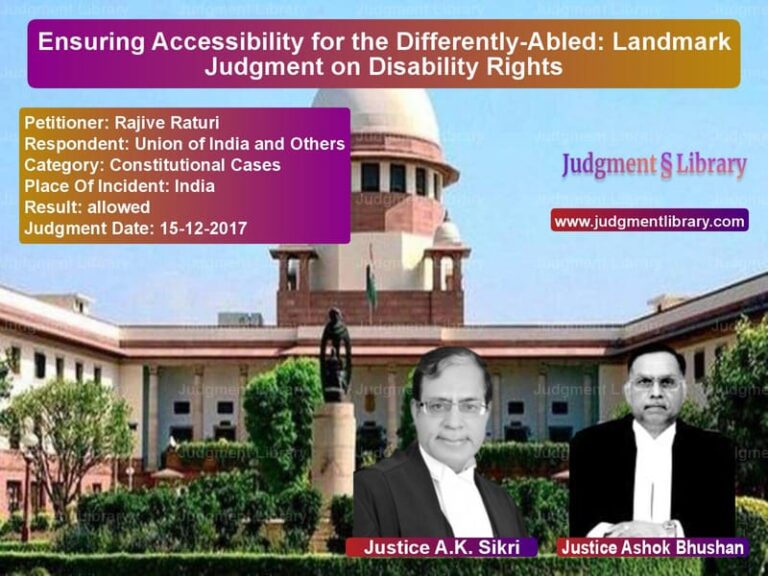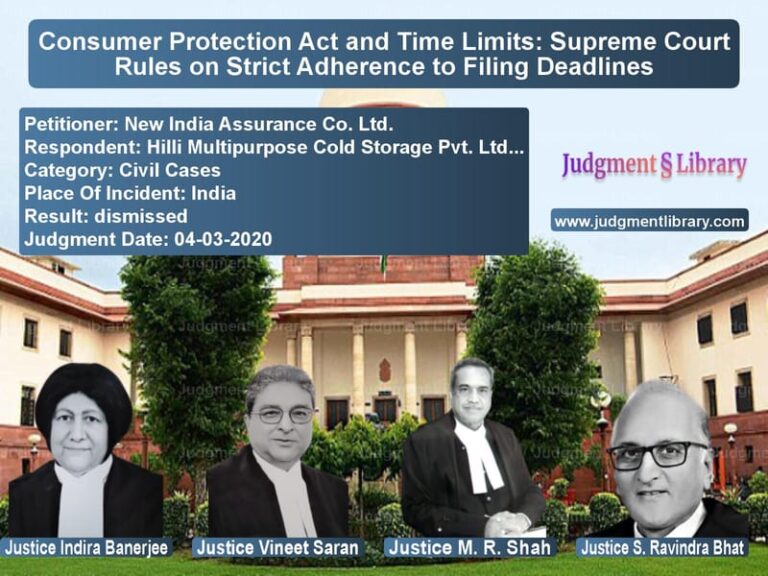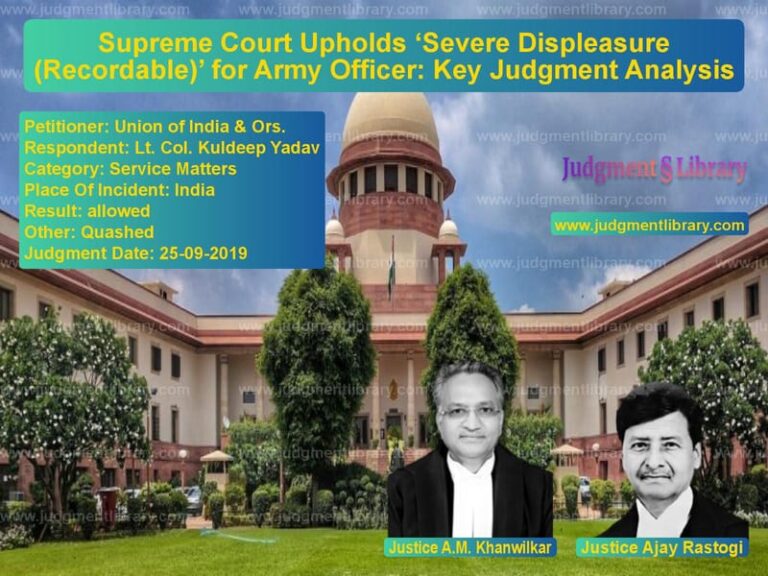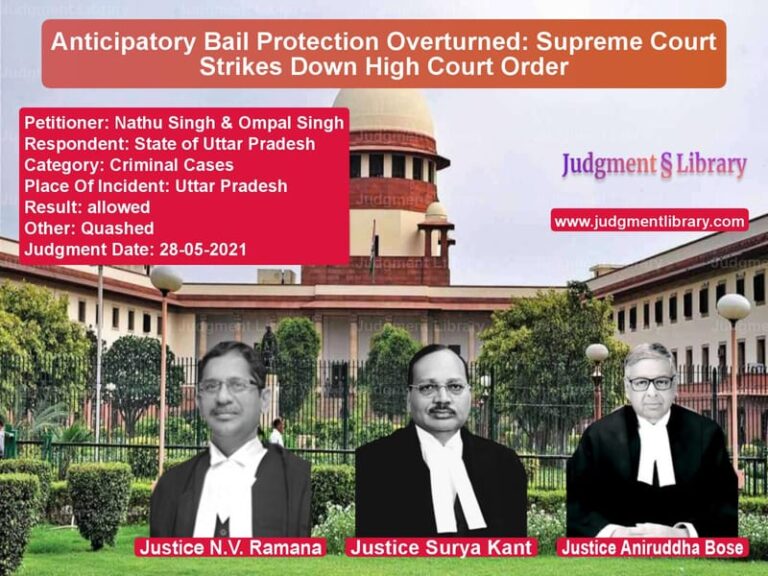NDPS Act and Search Procedures: Supreme Court’s Detailed Analysis in Ranjan Kumar Chadha Case
The Supreme Court of India recently ruled on a crucial case concerning the Narcotic Drugs and Psychotropic Substances Act, 1985 (NDPS Act). The case, Ranjan Kumar Chadha v. State of Himachal Pradesh, involved an important legal question regarding whether the procedural safeguards under Section 50 of the NDPS Act apply to the search of a bag. The Court, while delivering its verdict, made significant clarifications on the distinction between personal search and searches of belongings carried by an accused.
Background of the Case
The case originated from an incident that took place on August 23, 1998, at the Sarwari Bus Stand, Kullu, Himachal Pradesh. The local police, acting on a secret tip-off, intercepted Ranjan Kumar Chadha and conducted a search. During the search, the police found 1.250 kg of charas inside a bag he was carrying. Subsequently, Chadha was arrested and charged under Section 20 of the NDPS Act for possession of a narcotic substance.
The Trial Court, upon examination of the evidence, ruled in favor of the accused, holding that the search was conducted in violation of Section 50 of the NDPS Act. However, the High Court overturned this decision and convicted Chadha, holding that Section 50 does not apply to searches of bags. Aggrieved by the decision, Chadha approached the Supreme Court.
Legal Issues Before the Supreme Court
The primary legal issue before the Supreme Court was:
- Whether the procedural safeguards of Section 50 of the NDPS Act apply to the search of a bag carried by an accused?
Arguments of the Appellant (Ranjan Kumar Chadha)
The appellant’s counsel presented the following arguments in defense:
- Violation of Section 50: The police failed to inform the accused that he had the right to be searched in the presence of a Gazetted Officer or a Magistrate.
- Bag was inseparable from the person: Since the contraband was found in a bag the accused was carrying, the search should be considered a personal search requiring compliance with Section 50.
- Previous Acquittal by the Trial Court: The appellant argued that the Trial Court had rightly acquitted him because procedural safeguards were not followed.
- Reliability of Seizure: The appellant questioned whether the contraband was actually in his possession at the time of arrest.
Arguments of the Respondent (State of Himachal Pradesh)
The State opposed the appeal, arguing:
- Section 50 applies only to personal searches: The seizure was made from a bag and not from the body of the accused.
- No coercion was used: The accused voluntarily allowed the search without raising objections.
- High Court’s Judgment Was Legally Sound: The High Court had rightly convicted the accused based on the recovery of a narcotic substance.
Supreme Court’s Analysis
The Supreme Court conducted an extensive review of the NDPS Act and previous case laws, emphasizing key aspects:
1. Section 50 Applies Only to Personal Searches
The Court held that Section 50 of the NDPS Act only applies when contraband is found on a person. The Court cited precedents including State of Punjab v. Baldev Singh and Pawan Kumar v. State of Himachal Pradesh to reaffirm that the search of a bag, suitcase, or container does not fall within the ambit of personal searches requiring compliance with Section 50.
2. Search of a Bag is Distinct from a Personal Search
The Court observed:
“A bag, briefcase, or any such article or container cannot be treated as a part of a human body. They are separate and identifiable objects, and the search of such articles does not constitute a search of the person.”
3. No Procedural Irregularity in the Search
The Court rejected the argument that procedural violations had occurred. It found that the accused was given the option of being searched before a Gazetted Officer or Magistrate, but he voluntarily consented to the police search.
4. Safeguards Must Be Clearly Defined
The Court acknowledged the importance of procedural safeguards but clarified that broadening the scope of Section 50 beyond personal searches would be an incorrect interpretation.
5. Upholding the High Court’s Conviction
The Court ruled that the High Court had correctly convicted the accused and that his acquittal by the Trial Court was incorrect.
Supreme Court’s Final Ruling
The Supreme Court issued the following orders:
- Appeal Dismissed: The conviction under Section 20 of the NDPS Act was upheld.
- No Violation of Section 50: The search was legally valid, as it was of a bag and not a personal search.
- Sentence to be Served: The accused was directed to serve the sentence imposed by the High Court.
Implications of the Judgment
The judgment has significant legal implications:
- Clarifies the Application of Section 50: The ruling sets a clear precedent that personal searches and bag searches are to be treated differently under the NDPS Act.
- Strengthens Prosecution in Drug-Related Cases: Law enforcement agencies can now conduct searches of belongings without mandatory compliance with Section 50.
- Prevents Legal Misuse of Procedural Loopholes: Accused individuals cannot challenge seizures merely based on procedural grounds related to Section 50.
Conclusion
The Supreme Court’s judgment in Ranjan Kumar Chadha v. State of Himachal Pradesh reinforces the interpretation of Section 50 of the NDPS Act. It affirms that searches of bags and containers do not require compliance with procedural safeguards meant for personal searches. This ruling strengthens the legal framework surrounding narcotic seizures while ensuring procedural clarity in drug enforcement cases.
Petitioner Name: Ranjan Kumar Chadha.Respondent Name: State of Himachal Pradesh.Judgment By: Justice M.M. Sundresh, Justice J.B. Pardiwala.Place Of Incident: Sarwari Bus Stand, Kullu, Himachal Pradesh.Judgment Date: 06-10-2023.
Don’t miss out on the full details! Download the complete judgment in PDF format below and gain valuable insights instantly!
Download Judgment: ranjan-kumar-chadha-vs-state-of-himachal-pr-supreme-court-of-india-judgment-dated-06-10-2023.pdf
Directly Download Judgment: Directly download this Judgment
See all petitions in Drug Possession Cases
See all petitions in Bail and Anticipatory Bail
See all petitions in Judicial Review
See all petitions in Judgment by M.M. Sundresh
See all petitions in Judgment by J.B. Pardiwala
See all petitions in dismissed
See all petitions in supreme court of India judgments October 2023
See all petitions in 2023 judgments
See all posts in Criminal Cases Category
See all allowed petitions in Criminal Cases Category
See all Dismissed petitions in Criminal Cases Category
See all partially allowed petitions in Criminal Cases Category

